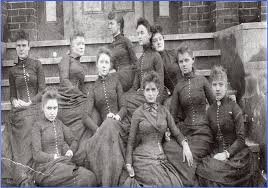Amelia Bowers
Reporter
Earlier this summer, the Mississippi University for Women accepted its first wave of
applications to its newly instituted Women’s College.
President Nora Miller convened the Women’s Mission Advancement Committee in the
fall of 2023 to explore the idea of a Women’s College amid campus-wide discussion about the
university’s role as a historically women’s college.
The Women’s College was approved by the state IHL in the spring of 2024 and
welcomed its very first class this fall semester.
Photo courtesy of University Relations
Dr. Kim Whitehead, the founding director of the Women’s College, was appointed in the
spring and has since served as head of the college and as an instructor within it. She sees the
program as a way to highlight women’s experiences in leadership roles of the past and present.
“This is a way for us to further empower our students by helping them through this wide
variety of courses that we already offer at The W, to make sense of the dynamics that shape
women’s lives and professional opportunities,” Whitehead explained.
The Women’s College is split into two curriculums for students: 1884 Scholars and 1884
Fellows. Both course loads are designed to be flexible additions for students of any major and
background to add to their degree.
Dr. Chanley Rainey, the current director of the Center for Women’s Research and Public
Policy and a Faculty Fellow for the Women’s College, emphasizes that any student, regardless of
gender identity, is welcome to apply. All the student has to have is authenticity, relevancy and
connection to the program’s studies.
“We’re looking for students with some kind of personal connection to the women's
missions,” Rainey said. “They have some story they can tell about why they are especially
interested in learning about women and gender, and that can be based on past experiences in their
lives, in the lives of family and friends.”
Lessa Harvey, a Fine Arts major at The W, was eager to become a member of the
Women’s College when she transferred from Mississippi Gulf Coast Community College.
Harvey was particularly interested in joining the Women’s College to aid in her future career
path.
“I plan to double major in software engineering, and that’s one of the main reasons that I
kind of chose to do the Women’s College because the industry that I want to work in is very
male-dominated, and I wanted the verbiage to educate and know that I have that with me when I
go into these careers,” Harvey said.
Faculty involved in the Women’s College view its creation as a necessary extension of
The W’s historical mission to empower women’s voices.
“The women’s college, focused on undergraduates, their education and empowering them,
Photo courtesy of MUW Archives
is a natural extension of our missions but it is also a way to preserve it into the future,” said
Whitehead.
Rainey agreed that the new college is important to preserving the spirit of women’s
empowerment that has been present on campus since the school’s conception, and she notes how
The W’s demographics are shifting, and more men are attending than have before.
“When I came here in 2016, we were still 84% female, now we are 77%,” Rainey said.
“We are trying hard to recruit all students, and I expect that we are going to see our campus
demographics continue to shift more toward gender parity.”
So, what does that have to do with the Women’s College?
Rainey believes that if these demographics shift much more then The W cannot continue
to rely on women’s leadership continuing to grow. She believes that a program like the Women’s College is an important step in emphasizing women’s leadership through programming and
coursework.
“We don’t want women to wait and see if a man’s going to step up to lead,” Rainey said.
“We want women to be aware of that tendency in themselves to understand why that is
historically something that we are socialized to do, but to understand that it’s important that
women overcome that, that men be aware of it, and both encourage women’s leadership.”
To Harvey, a Women’s College on campus is a perfect extension of the school’s mission
and succeeds in its goal of empowerment. She sees the Women’s College as a way to reflect on
The W’s reason for establishment but also a way of empowerment.
Courtesy of Women’s College brochure
“We want to create this space for everyone,” Harvey said. “Because The W is a very
liberal campus, it’s very progressive in the views and the students that go here, and I just feel like
that goes more into empowering the student body.”
Students interested in learning more about the Women’s College are encouraged to talk to
faculty, the director, and even student cohort members. Anyone can also follow the college
Instagram account @thew_womenscollege.
Those who wish to apply can visit the website at https://www.muw.edu/womenscollege
or talk to their adviser about choosing the path that works best for them.


